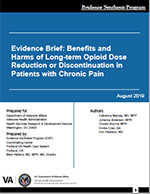
Prepared by:
Evidence Synthesis Program (ESP) Coordinating Center
Portland VA Health Care System
Portland, OR
Mark Helfand, MD, MPH, MS, Director
Recommended Citation:
Mackey K, Anderson J, Bourne D, Chen E, Peterson K. Evidence Brief: Benefits and Harms of Long-term Opioid Dose Reduction or Discontinuation in Patients with Chronic Pain. Washington, DC: Evidence Synthesis Program, Health Services Research and Development Service, Office of Research and Development, Department of Veterans Affairs. VA ESP Project #09-199; 2019.
Download PDF: Brief, Supplemental Materials
The ESP Coordinating Center (ESP CC) is responding to a request from VA Health Services Research and Development Service (HSR&D) for an evidence brief on patient outcomes following long-term opioid dose reduction or discontinuation. Findings from this evidence brief will be used to inform prioritization of questions for a State-of-the-Art conference in September 2019.
Key Question 1: Among patients prescribed long-term opioid therapy for chronic pain, what are the benefits and harms of opioid dose reduction or discontinuation?
Key Question 2: Do the benefits and harms of opioid dose reduction or discontinuation vary by:
Benefits and Harms of Long-term Opioid Dose Reduction or Discontinuation in Patients with Chronic Pain (Management Brief)
Mackey K, Anderson J, Bourne D, Chen E, and Peterson K. Benefits and Harms of Long-term Opioid Dose Reduction or Discontinuation in Patients with Chronic Pain: A Rapid Review. Journal of General Internal Medicine. 2020;35:935-944. DOI: https://doi.org/10.1007/s11606-020-06253-8